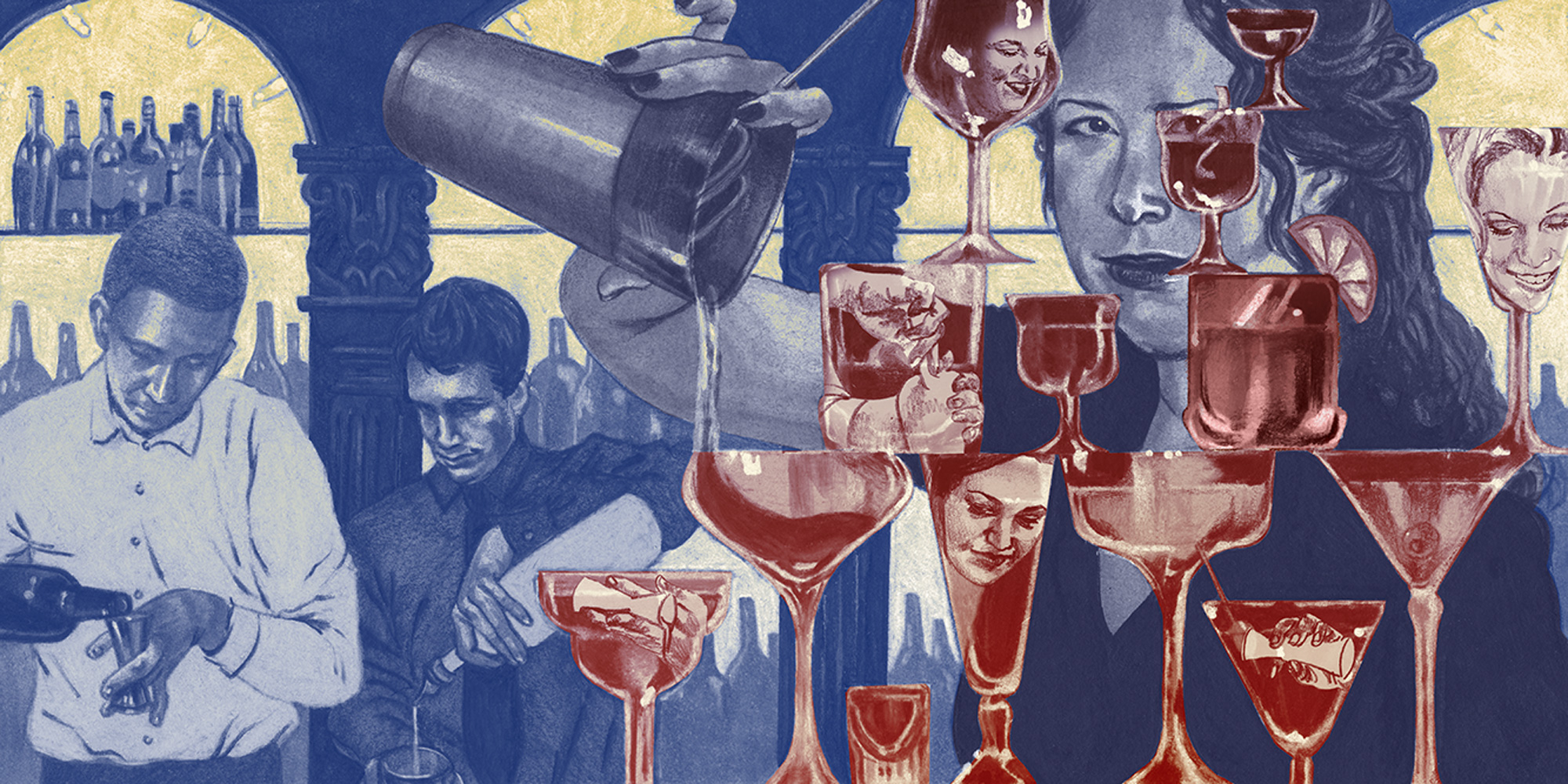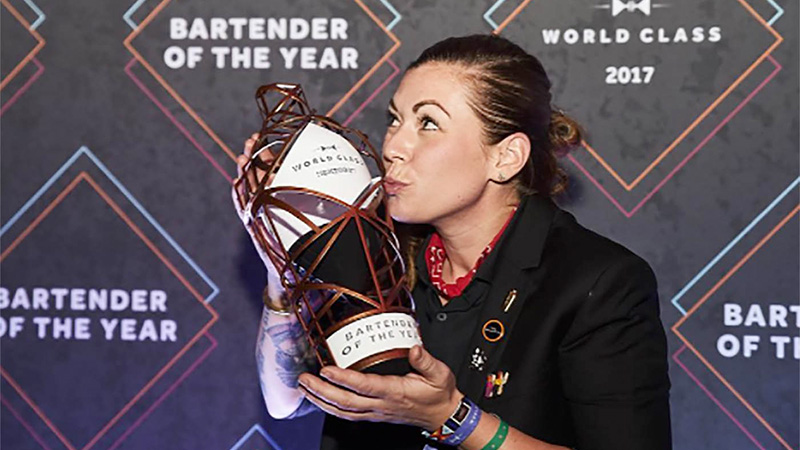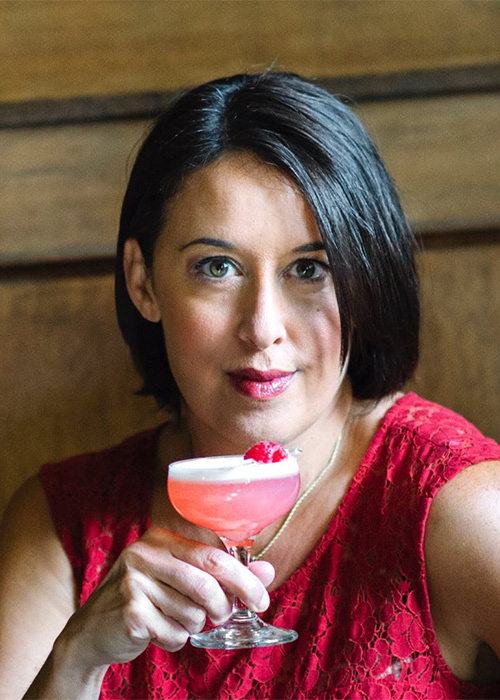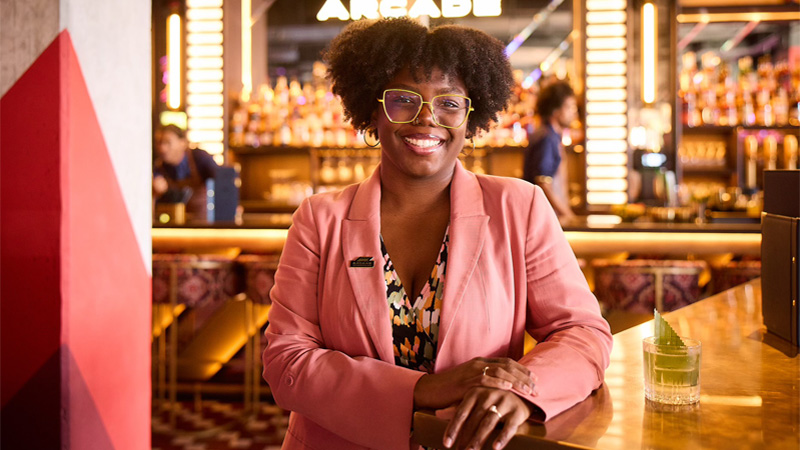
It wasn’t until Netflix released “Drink Masters” in 2022 that the average bar guest realized mixing cocktails could be a competitive sport. “It is weird and strange,” says LP O’Brien, the first (and to date only) winner of the show. “We have celebrity chefs, not mixologists.”
While anyone with a Netflix subscription can relive O’Brien’s journey at their own leisure, most competitions aren’t as accessible to the general public. Cocktail contests are not new. In fact, they aren’t even a modern invention. But most follow something of a similar formula these days.
Larger competitions move from local, to national, to global stages. Prizes include cash, travel, job opportunities, and press. Competitors tend to come from cocktail-heavy bar programs, although, depending on the rules, they might work just about anywhere as long as they possess the creativity, drive, and presence to throw down. Entering a cocktail competition can be as simple as contacting the organizer or as in depth as a college application, complete with essays, and some, like Drink Masters, include self-tapes.
Every brand structures its competition differently; the bigger the brand sponsor, the bigger the show. One of the largest cocktail competitions in the world is (unsurprisingly) sponsored by one of the largest spirits conglomerates. Diageo World Class has a reach that extends to roughly 60 countries and is an eight-month commitment, beginning with a paper application on the local level and ending with the national winners competing on the global stage for the title of “Bartender of the Year.” In 2023, Diageo World Class documented the event via Spirit on Prime, while other brands have streamed their comps on YouTube, further expanding the visibility of the competitive bar world.
Kaitlyn Stewart, a Canada-based bartender and spirits educator, became the second woman to win World Class and be crowned Diageo’s Bartender of the Year in 2017. She was inspired to apply after watching the global competition in South Africa on YouTube. “It was the first time I saw someone who looked and bartended like me and thought, ‘I could do this,’” she says.

Indeed, most cocktail competitions champion the individual, and for a very long time, those individuals tended to all look alike: male and mostly white. It was a pretty accurate snapshot of who was allowed behind the bar in the late ‘90s and early aughts. Cocktail bars were synonymous with men sporting mustache wax; if there were female employees, they were typically relegated to carrying trays, even if they expressed interest in advancing.
All of which begs the questions: Who is getting the opportunities at the entry level these days? And how are we training and encouraging all of our staff so that competitors, finalists, and winners better represent the modern bar world and society in general?
Why Aren’t There More of Us?
Like most women in this industry, the jobs I had in my early 20s refused to let me bartend. When I finally got behind the stick, putting me in a position to potentially apply for competitions, several of my female contemporaries were told that they “did not look like bartenders.” The reason being? They were not wearing three-piece suits for the competition. (Women weren’t allowed to wear pants on the Senate floor until 1993 and here we are 30-odd years later getting shade for being “too ladylike.”)
“Seeing different people winning is a result of diversifying judging panels so there is no bias and there are different thought processes and palates,” says Julie Reiner, owner of award winning NYC bars Clover Club and Milady’s, and judge on Drink Masters. Reiner moved to New York in the ‘90s, working with “King Cocktail” Dale DeGroff before opening the Flatiron Lounge in 2003.
While progress has undoubtedly been made, it’s impossible to change the status quo if we continue to celebrate those who refuse to evolve with the times.
It’s hard to overstate the impact she’s had on the industry since then. Reiner not only opened the door for future generations of women in the bar world, she physically put cocktail shakers in their hands. Yet, to date, the No. 1 question she is asked in interviews is, “What’s it like to be a woman in the bar world?” The only difference Reiner notes isn’t that of ability, technique, or palate — when she makes a drink, her “boobs shake.”

In 2013, Reiner became the first female judge for World Class. “I felt like the token woman in a lot of ways,” she says. Three years after Reiner joined the judging panel, France’s Jennifer Le Nechet became the first woman named Diageo’s Bartender of the Year. Canada’s Stewart took the title the following year, cementing the fact that women had firmly entered the chat. Between 2013 and 2018, women took wins in Bacardi Legacy, Most Imaginative Bartender, the IBA World Cocktail Championship, and Patron Perfectionist, as well as runner-up spots for Nikka Perfect Serve.
While progress has undoubtedly been made, it’s impossible to change the status quo if we continue to celebrate those who refuse to evolve with the times. In the fall of 2019, right before I was to compete in the Nikka globals, Charles Schumann was swiftly replaced as the third judge on the heels of #womenbehindthebarafter3.
The hashtag, spawned in response to sexist comments that Shumann, a famous German barman, had made years prior, allegedly noting that “‘women were welcome to work in bars but only up until 3 p.m., as that is when the real work started.” That fall, the World’s 50 Best Bars named Shumann “Industry Icon.” The industry itself vehemently disagreed, though, and the hashtag has been included in roughly 4,000 Instagram posts to date. I was relieved that the Nikka organizers realized his values had no place on a judging panel, but watching a major industry awards organization honor a man who was also quoted as saying “a bar is no place for a woman” feels a little like finding out your folks voted for someone who overturned Roe.
Paving the Way
Being the first and setting an example is as daunting as it is exhilarating. There is a responsibility when you pave the way. Continuing to have these conversations is crucial — it wasn’t that long ago that women weren’t even allowed in a bar, forget about behind it.
I will gladly tell anyone thinking of entering a competition or stepping behind the bar: “We are here, we will help you on your journey, you are not alone.”
An exception back in the early aughts was Reiner’s Flatiron Lounge. When cocktail waitress Lynnette Marrero expressed an interest in jumping behind the bar, she was encouraged and given the tools to succeed. That word is a vast simplification: Marrero has gone on to run award-winning beverage programs, is the co-host of the only cocktail focused MasterClass, and just designed a line of RTD cocktails with J.Lo. Marrero also founded the N.Y. chapter of Ladies United for the Preservation of Endangered Cocktails (LUPEC) in 2009. LUPEC began in Pennsylvania as a meet-up of women in the cocktail world with a philanthropic focus and the goal of “dismantling the patriarchy — one drink at a time.”

In 2011, Marrero filled in at agave bar Mayahuel, and met Ivy Mix. Today, Mix is a published author with a James Beard-nominated bar, Leyenda. Back then, “Ivy knew more about agave than anyone I know,” Reiner, a co-owner of Leyenda, says. “But she couldn’t get bar shifts.”
Mix approached Marrero with the idea for a competition that would celebrate, connect, and promote women. Taking inspiration from TV competition shows, Speed Rack is a high-intensity, all-female+ cocktail competition that raises money for breast cancer research and celebrates mentorship. Competitors train together and support each other. I am proud to be a part of the Speed Rack network (along with O’Brien and Stewart), and will gladly tell anyone thinking of entering a competition or stepping behind the bar: “We are here, we will help you on your journey, you are not alone.”
Thirteen seasons later, Mix and Marrero have created a community that spans the globe. The magic extends beyond the network. In the years after its inception, Speed Rack has created a safe space for women to meet each other — whether in person or online — and share insight and encouragement on a global scale. “I saw the amount of women in all markets grow,” Reiner says.
Yes, there is undoubtedly still work to be done, but in so many ways, the industry has moved forward, taking competitions with it. Drink Masters showcased an amazingly diverse cast of competitors and judges on a highly visible platform. Diageo has added diversity training for its North American World Class judges. The U.S. competitors for Nikka Perfect Serve were half women this year, with Tara Wong going on to compete in the globals in December. The more we promote, mentor, and loudly and warmly welcome others into this industry, the faster we can see the changes of our modern bar world reflected on the global stage. The bar is indeed a place for a woman, and so is the winner’s podium.
The article Shakers Can Break Ceilings: The Rise of Women in Global Cocktail Competitions appeared first on VinePair.






